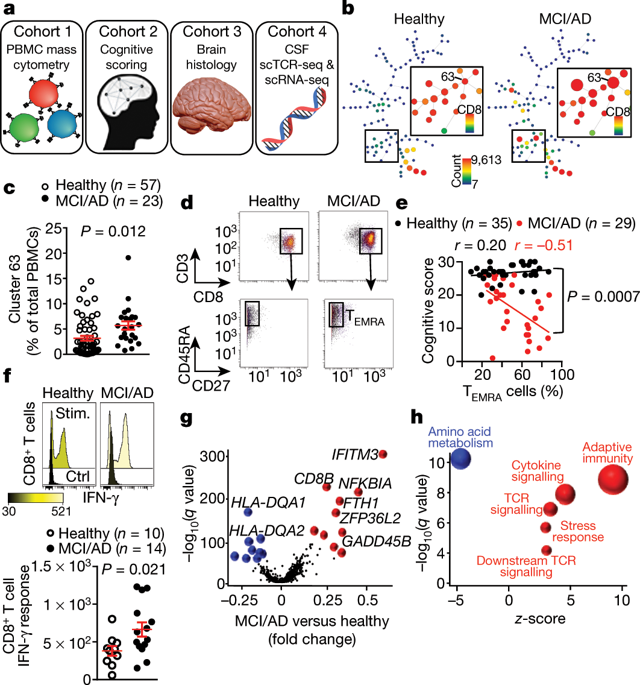Nature ( IF 50.5 ) Pub Date : 2020-01-08 , DOI: 10.1038/s41586-019-1895-7 David Gate 1, 2 , Naresha Saligrama 3 , Olivia Leventhal 1 , Andrew C Yang 4, 5 , Michael S Unger 6, 7 , Jinte Middeldorp 1, 2, 8 , Kelly Chen 1 , Benoit Lehallier 1, 2 , Divya Channappa 1 , Mark B De Los Santos 1 , Alisha McBride 1, 2 , John Pluvinage 1, 9, 10 , Fanny Elahi 11 , Grace Kyin-Ye Tam 1, 12 , Yongha Kim 1, 12 , Michael Greicius 1, 12 , Anthony D Wagner 13, 14 , Ludwig Aigner 6, 7 , Douglas R Galasko 15 , Mark M Davis 3, 16, 17 , Tony Wyss-Coray 1, 2, 5, 14, 18

|
Alzheimer’s disease is an incurable neurodegenerative disorder in which neuroinflammation has a critical function1. However, little is known about the contribution of the adaptive immune response in Alzheimer’s disease2. Here, using integrated analyses of multiple cohorts, we identify peripheral and central adaptive immune changes in Alzheimer’s disease. First, we performed mass cytometry of peripheral blood mononuclear cells and discovered an immune signature of Alzheimer’s disease that consists of increased numbers of CD8+ T effector memory CD45RA+ (TEMRA) cells. In a second cohort, we found that CD8+ TEMRA cells were negatively associated with cognition. Furthermore, single-cell RNA sequencing revealed that T cell receptor (TCR) signalling was enhanced in these cells. Notably, by using several strategies of single-cell TCR sequencing in a third cohort, we discovered clonally expanded CD8+ TEMRA cells in the cerebrospinal fluid of patients with Alzheimer’s disease. Finally, we used machine learning, cloning and peptide screens to demonstrate the specificity of clonally expanded TCRs in the cerebrospinal fluid of patients with Alzheimer’s disease to two separate Epstein–Barr virus antigens. These results reveal an adaptive immune response in the blood and cerebrospinal fluid in Alzheimer’s disease and provide evidence of clonal, antigen-experienced T cells patrolling the intrathecal space of brains affected by age-related neurodegeneration.
中文翻译:

克隆扩增的 CD8 T 细胞在阿尔茨海默病患者的脑脊液中巡逻
阿尔茨海默氏病是一种无法治愈的神经退行性疾病,其中神经炎症起着关键作用1 。然而,人们对适应性免疫反应在阿尔茨海默病中的作用知之甚少2 。在这里,通过对多个队列的综合分析,我们确定了阿尔茨海默氏病的外周和中枢适应性免疫变化。首先,我们对外周血单核细胞进行了质谱流式分析,发现了阿尔茨海默病的免疫特征,其中包括数量增加的 CD8 + T 效应记忆 CD45RA + ( TEMRA ) 细胞。在第二个队列中,我们发现 CD8 + T EMRA细胞与认知呈负相关。此外,单细胞 RNA 测序显示,这些细胞中的 T 细胞受体 (TCR) 信号传导增强。值得注意的是,通过在第三组中使用多种单细胞 TCR 测序策略,我们在阿尔茨海默病患者的脑脊液中发现了克隆扩增的 CD8 + T EMRA细胞。最后,我们使用机器学习、克隆和肽筛选来证明阿尔茨海默病患者脑脊液中克隆扩增的 TCR 对两种不同的 Epstein-Barr 病毒抗原的特异性。这些结果揭示了阿尔茨海默病患者血液和脑脊液中的适应性免疫反应,并提供了克隆性、抗原经历过的 T 细胞在受年龄相关神经变性影响的大脑鞘内空间巡逻的证据。











































 京公网安备 11010802027423号
京公网安备 11010802027423号